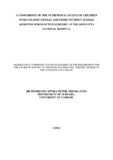| dc.contributor.author | Mwirichia, Peter M | |
| dc.date.accessioned | 2017-01-05T07:33:10Z | |
| dc.date.available | 2017-01-05T07:33:10Z | |
| dc.date.issued | 2016 | |
| dc.identifier.uri | http://hdl.handle.net/11295/99049 | |
| dc.description.abstract | Eighty(80) children aged between thirty days and ten years were enrolled in a descriptive
observational case-control study which compared the nutritional status of children with
colonic stomas(40/80) to those without stomas(40/80) admitted for elective surgery at
Kenyatta National Hospital.
Nutritional status was determined by Subjective Global Nutritional Assessment (SGNA) and
anthropometric indicators (height/age, weight/age, and body mass index/age), which were
stratified by gender, with World Health Organization standards used as reference.
The average WHZ, HAZ and WAZ scores among cases with colostomies were 1.23, 1.33 and
1.15, respectively compared to mean scores of 1.05, 1.3 and 1.18 among the controls,
respectively. 22.5% of the children with colostomies had Wasting compared to 5% among
the controls, with colostomies having a five-fold increase in the risk of wasting compared to
the controls. There was however, no significant association between stunting or underweight
and colostomies. 55% of the children with colostomies had anaemia compared to 32.5%
amongst the controls. The mean haemoglobin level in children with colostomies (10.3 ±1.87)
was 1 unit lower (95% CI 0.14 – 1.86) compared to the mean levels in controls (11.29±2.06).
Similarly the mean MCV in children with colostomies was 61.85±18.15 compared to a mean
MCV of 71.14±13.13 among controls. Children with a colostomy due to HSD had
significantly lower mean haemoglobin levels (9.66±1.70) compared to those with a
colostomy due to ARM (11.36±1.70). The socioeconomic characteristics of caretakers of
children with colostomy were comparable to those of caretakers of children without
colostomy.
The prevalence of malnutrition in paediatric surgical admissions is high and there exists a
significant association between wasting, low haemoglobin, low MCV values and colonic
stomas. Therefore, nutritional status screening programs and institution of corrective
nutritional care among paediatric surgical patients with colostomies is necessary to prevent
the adverse effects on healing, growth and surgical outcome. | en_US |
| dc.language.iso | en_US | en_US |
| dc.publisher | University of Nairobi | en_US |
| dc.rights | Attribution-NonCommercial-NoDerivs 3.0 United States | * |
| dc.rights.uri | http://creativecommons.org/licenses/by-nc-nd/3.0/us/ | * |
| dc.title | A comparison of the nutritional status of children with colonic stomas and those without stomas admitted for elective surgery at the Kenyatta national hospital. | en_US |
| dc.type | Thesis | en_US |
| dc.description.department | a
Department of Psychiatry, University of Nairobi, ; bDepartment of Mental Health, School of Medicine,
Moi University, Eldoret, Kenya | |


